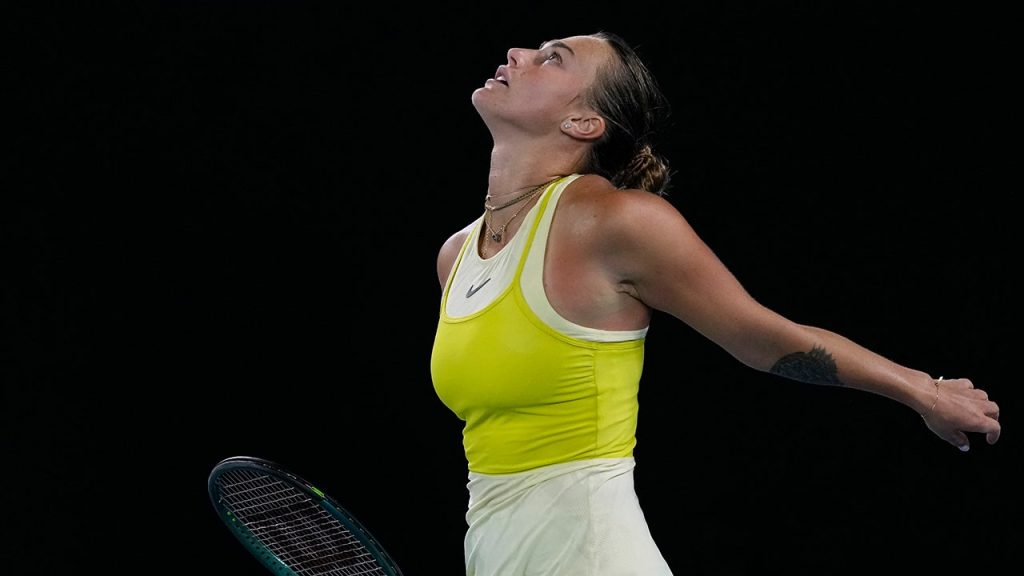The electrifying atmosphere of Rod Laver Arena in Melbourne witnessed a dramatic upset in the women’s singles final of the Australian Open as American Madison Keys dethroned the world’s number one player, Aryna Sabalenka, in a thrilling three-set showdown. The match, a rollercoaster of momentum swings and powerful groundstrokes, culminated in Keys claiming her maiden Grand Slam title with a 6-3, 2-6, 7-5 victory, leaving Sabalenka to grapple with the bitter taste of defeat.
Sabalenka, aiming to etch her name into tennis history by becoming the first player since Martina Hingis to secure three consecutive Australian Open crowns, entered the final as the clear favorite. However, Keys, unburdened by expectation and playing with newfound freedom, disrupted Sabalenka’s rhythm from the outset. The American’s aggressive baseline play and pinpoint serves kept Sabalenka on the defensive, allowing her to capture the first set.
The second set saw Sabalenka regain her composure and unleash her trademark power. Dictating rallies and finding the corners with precision, she leveled the match, setting the stage for a decisive third set. The tension in the stadium was palpable as both players battled fiercely, each game a microcosm of the larger struggle for supremacy.
The final set proved to be a nail-biting affair, with both players exchanging blows and refusing to yield. Momentum swung back and forth like a pendulum, leaving spectators on the edge of their seats. Ultimately, it was Keys who found another gear in the crucial moments, capitalizing on a few key errors from Sabalenka to secure the historic victory.
The immediate aftermath of the match captured the raw emotions of both competitors. While Keys celebrated her breakthrough achievement, Sabalenka’s disappointment was evident. After the customary handshake with Keys and the umpire, Sabalenka, unable to contain her frustration, slammed her racket on the court before retreating to the locker room. This outburst, a visceral display of competitive fire, provided a glimpse into the intense pressure and emotional toll of competing at the highest level of professional sport.
In her post-match press conference, Sabalenka acknowledged the frustration that fueled her outburst, attributing it to the proximity of achieving something extraordinary. She explained the need to release her negative emotions in a physical manner, emphasizing that doing so allowed her to compose herself and address the media with respect. Sabalenka’s candor provided insight into the mental fortitude required of elite athletes and the complex emotions they navigate in the face of both triumph and defeat. She even managed to find humor in the situation, playfully blaming her team for the loss, a testament to her resilience and ability to move forward. Despite the disappointment, Sabalenka graciously acknowledged Keys’ exceptional performance, vowing to return with even greater determination in their future encounters.
Keys, reflecting on her remarkable achievement, expressed a sense of relief and validation. At 29, she had finally achieved the Grand Slam dream that had seemed increasingly elusive throughout her career. She admitted to carrying the weight of expectation for years, feeling as though she had failed to live up to her potential if she didn’t win a major title. Keys’ victory not only marked a significant milestone in her career but also served as a testament to her perseverance and self-belief. Overcoming the mental hurdles and self-doubt, she embraced the present and played with a freedom that ultimately propelled her to victory.
The Australian Open final served as a compelling narrative of contrasting emotions: the elation of a first-time Grand Slam champion and the agonizing frustration of a world number one falling short of her ambitious goals. It highlighted the intense pressure and emotional rollercoaster that athletes experience in the pursuit of excellence. Sabalenka’s outburst, though controversial, underscored the raw emotion inherent in high-stakes competition, while Keys’ triumph was a testament to her resilience and belief in her abilities. The match will be remembered not only for its thrilling conclusion but also for the human drama that unfolded on and off the court. It served as a reminder that even in the world of professional sport, vulnerability and resilience are intertwined, revealing the human aspect behind the athletes’ remarkable feats.










